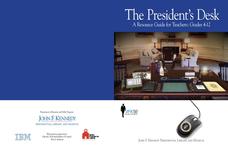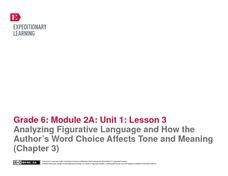iCivics
Propaganda: What’s the Message?
As class members progress through eight fully prepared learning stations, they will identify how bias is present in persuasive media, as well as differentiate among types of propaganda techniques like bandwagon propaganda and the use of...
C.S. Lewis Foundation
Educator’s Guide to The Lion, The Witch and the Wardrobe #1
Perfect for both classroom and homeschool settings, this 72-page resource packet, designed for C.S. Lewis's The Lion, The Witch and the Wardrobe, is a must-have for your curriculum library. Chapter-by-chapter vocabulary lists and...
International Reading Association
Children’s Choices 2014
Books for kids, chosen by kids! What could be better? This packet is made up of book lists, each with approximately 30 books included, organized by age group. Kids will enjoy the summer reading materials they choose from this resource!
Association for Library Service to Children
Summer Reading List Grades 6-8
What better activity is there for summer than reading? Provide your pupils with 25 book ideas for their summer reading pursuits. A variety of different genres are represented on this list, and each book is paired with publication...
Primary Success Publication
St. Patrick’s Day Ideas
Poems, activities, games, recipes, and leprechaun tricks abound in a resource packet designed for St. Patrick's Day. There are even measuring, graphing, and mapping activities. How lucky!
K12 Reader
Why Do We Need Pronouns?
Who needs pronouns? Everyone! Show your class the power of pronouns with this worksheet. Learners read a sample paragraph that doesn't include any pronouns and then revise that paragraph by filling in the appropriate pronouns.
Federal Reserve Bank
Ten Mile Day
Get your class working on the railroad with this detailed and interactive lesson. After reading and discussing Ten Mile Day, learners explore division of labor, human capital, and productivity with a hands-on group activity in which they...
Hyperion
Crispin: The Cross of Lead
Avi's Crispin: The Cross of Lead is the focus of a teacher's guide that provides background information on 14th Century England, a plot summary, discussion questions, activities, and resource links. A must-have for those who use this...
Staples Foundation For Learning
The President’s Desk
What stories can a desk paperweight and picture frame possibly tell us about the president of the United States? Pupils are transported to the desk of President John F. Kennedy through an engaging interactive site. The guide offers a...
EngageNY
End of Unit 1 Assessment: Analyzing an Excerpt from Barack Obama’s Back-to-School Speech
In order to assess their mastery of the concepts taught in a 12-lesson plan unit study of Christopher Paul Curtis' Bud, Not Buddy, individuals read excerpts from President Barack Obama's 2009 Back-to-School Speech and use the strategies...
EngageNY
Getting the Gist and Determining Word Meaning: Paragraphs 12–14 of Steve Jobs’ Commencement Address (and connecting to Chapter 8)
Groups use a Venn diagram to compare the theme of love and loss in Steve Jobs' 2005 commencement address to Stanford University students and Christopher Paul Curtis' Bud, Not Buddy.
EngageNY
Mid-Unit 1 Assessment: Figurative Language and Word Choice in Bud, Not Buddy (Chapter 5)
Individuals utilize the strategies practiced in the previous lesson to complete a mid-unit assessment on figurative language and how Christopher Paul Curtis uses word choice to create meaning in Bud, Not Buddy.
EngageNY
Analyzing Figurative Language and How the Author’s Word Choice Affects Tone and Meaning (Chapter 3)
How figurative language affects the tone and meaning in Chapter Three of Christopher Paul Curtis' Bud, Not Buddy is the focus of a series of exercises that ask readers to locate, record, and analyze Curtis' word choices.
EngageNY
Figurative Language and Word Choice: A Closer Look at Bud, Not Buddy (Chapter 2)
The difference between an average and an unforgettable writing can lie in the author's word choice. The figurative language in Chapter 2 of Christopher Paul Curtis's Newbery Medal Winner, Bud, Not Buddy, is the focus of a series of...
Have Fun Teaching
Identifying Author's Purpose
The multi-lesson, 47-page packet contains everything you need to ensure kids can recognize the clues provided to identify the type of text, the intended audience, and the author's purpose in writing the passage.
KIPP 3D Academy
Epic Poetry Unit
The Odyssey is the core text in this unit study of the hero's journey motif. Along the way, kids research Greek and Roman history, mythology, art, and epic poetry. The 104-page packet is perfect for homeschool or classroom situations and...
Foreign Policy Association
U.S. and Europe Online Lesson Plan
Class groups investigate the economic and political implications of a country's policies on genetically modified foods, craft a position paper detailing that policy, and share their findings with the class. Armed with this information,...
MENSA Education & Research Foundation
It’s Greek to Me: Greek Mythology
Designed as extension exercises in homeschool or classroom settings, as well as for individual work, the ideas in this packet are sure to engage learners in an investigation of Greek mythology.
Curated OER
Beowulf: Lesson Plan and Supplementary Materials
A reading of Beowulf: Dragon Slayer, Rosemary Sutcliff's retelling of the classic epic poem, launches an exploration of what it means to be a hero, a noble leader, and a great warrior. A great way to introduce middle schoolers to this...
Briscoe Center for American History
Applying the SOAPS Method of Analyzing Historical Documents
Young historians use the SOAPS (Speaker, Occasion, Audience, Purpose, Subject) method of questioning to determine the historical value of primary source documents. The third in a series of five lessons that model for learners how...
Scholastic
Step-by-Step Strategies for Teaching Expository Writing
A carefully crafted, logically organized, 128-page packet is an excellent addition to your unit on expository writing.
Crafting Freedom
Frances Ellen Watkins Harper: Lover of Literacy
This, the sixth in a series of 10 related resources, examines the life and works of Frances Ellen Watkins Harper, an African American author, born in 1825, who advocated literacy for both free and enslaved African Americans.
Crafting Freedom
George Moses Horton: Crafting Virtual Freedom Through Poetry
What is "virtual freedom"? How about "enslaved entrepreneurship"? Class members will learn about these terms and much more as they read the poems and examine the life of George Moses Horton.
Crafting Freedom
Harriet Jabocs and Elizabeth Keckly: The Material and Emotional Realities of Childhood in Slavery
Learning how to make accurate inferences by putting together facts found in multiple sources is one of those skills all learners must develop, but one that can be a challenge to teach. This resource is a must-have for your curriculum...

























